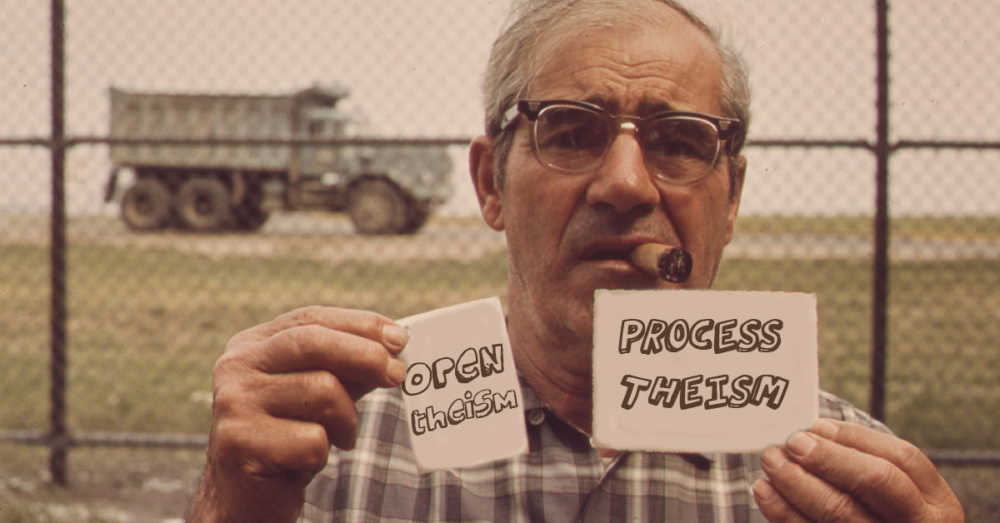We run our website the way we wished the whole internet worked: we provide high quality original content with no ads. We are funded solely by your direct support. Please consider supporting this project.

Process Theology & Open Theism: What’s the Difference?
Question: When ReKnew talks about Open Theism is it a mistake for people to equate it with Process theology, and if so what are the defining differences?
I guess I am starting to lean toward Dr. Boyd’s thoughts for all things theologically egg-heady, so I thought I would ask the question. Your ministry has been freeing for me, and has helped to save my faith after my son had cancer. I only joke because I feel very close to you guys even though we have only met in passing in a very crowded coffee shop and after a couple of sermons that hit me so hard I was at a loss for words.
Answer: Thanks for the kind words of affirmation. I wrote my doctoral dissertation on Process thought (Trinity and Process) where I critiqued the metaphysics of Charles Hartshorne and tried to demonstrate that one can adopt a system that has all the explanatory power of Process Thought (PT) without its unorthodox implications. The unorthodox implications are these.
- In PT, God exists eternally in relation to a non-divine world. So PT denies “creation ex nihilo”
- In PT, God is bound to metaphysical principles that govern both God and the world. So God isn’t able to really interact with the world as a personal being. God must always, of necessity, respond in ways that the metaphysics of the system stipulate. This means…
- In PT God can’t intervene in unique ways, like personally answering prayer
- In PT God can’t intervene and perform miracles
- In PT God can’t become uniquely embodied, as he is in Christ.
These are pretty serious shortcomings. I hope it’s clear that PT has got little in common with Open Theism other than that we both believe the future is partly comprised of possibilities. But even here there is a major difference. In Open Theism, God chooses to create a world with an open future, while in PT God has created of necessity.
I am very concerned that so many progressive thinking evangelicals are flirting with Process Thought. It’s really not a friendly home for anything like orthodox Christianity. While many find the dynamic and relational ontology of process thought, compelling—I can see how this is attractive— the intrinsic nature of the system is hostile to the Christian faith.
If you want to go deeper on this topic, my book Trinity and Process seeks to clarify all that’s positive with PT while avoiding all that’s negative. For a succinct summary of some of the shortcomings of PT, see chapter 9 in my book Satan and the Problem of Evil.
Category: Q&A
Tags: Open Theism, Process Theology, Q&A
Topics: Open Theism What it is and is not
Related Reading

How do you respond to Genesis 25:23?
The Lord told Rebekah, “Two nations are in your womb, and two peoples born of you shall be divided; the one shall be stronger than the other, the elder shall serve the younger.” (cf. Rom. 9:12–16) Old Testament scholars agree that the author (and later, Paul in Romans 9) has the descendants of Jacob and…

Does the Bible teach total non-violence?
I wouldn’t say the whole Bible teaches non-violence, for you find Yahweh engaging in quite a bit of violence in the Old Testament. But I would say that the whole Bible clearly presents non-violence as God’s dream for humanity, and I would most certainly say this dream is realized in Jesus Christ and the Kingdom…

What did Jesus mean when he said he came not to bring peace, but a sword (Mt 10:34)?
Given Jesus’ uniform teaching about loving enemies and abstaining from violence, and given that his followers were known for their refusal to engage in violence for the first three hundred years of church history, it’s obvious that Jesus wasn’t saying he came so that his disciples would use swords. The context of Jesus’ comment makes…

What is the right way to interpret Revelation?
Few biblical topics have captured the imagination of contemporary evangelicals like the book of Revelation. The recent unprecedented success of the Left Behind series is evidence of this popular fascination. Many evangelicals don’t realize that the futuristic interpretation of Revelation advocated in this popular series is only one of several interpretations evangelicals espouse. Here’s the…

How do you respond to Malachi 3:6?
“For I the Lord do not change; therefore you, O children of Jacob, have not perished.” Some cite this verse as evidence that God need never be flexible in his plans and change his mind. But this claim contradicts all the explicit declarations in Scripture which state that God does frequently modify his plans and…

What is the significance of Acts 21:10–12?
While Paul and Luke were making preparations to go and preach in Jerusalem, “a prophet named Agabus came down from Judea.” The prophet approached Paul, took his belt, and announced, “Thus says the Holy Spirit, ‘This is the way the Jews in Jerusalem will bind the man who owns this belt and will hand him…
